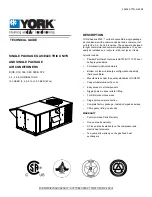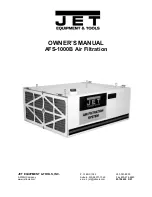
Pre-Start
42
RT-SVX46G-EN
Test Modes
There are three methods in which the “Test” mode can be
cycled at LTB-Test 1 and LTB-Test 2.
1. Step Test Mode - This method initiates the different
components of the unit, one at a time, by temporarily
shorting across the two test terminals for two to three
seconds. For the initial startup of the unit, this method
allows the technician to cycle a component “On” and
have up to one hour to complete the check.
2. Resistance Test Mode - This method can be used for
startup providing a decade box for variable resistance
outputs is available. This method initiates the different
components of the unit, one at a time, when a specific
resistance value is placed across the two test
terminals. The unit will remain in the specific test mode
for approximately one hour even though the
resistance is left on the test terminals.
3. Auto Test Mode - This method is not recommended for
startup due to the short timing between individual
component steps. This method initiates the different
components of the unit, one at a time, when a jumper
is installed across the test terminals. The unit will start
the first test step and change to the next step every 30
seconds.
At the end of the test mode, control of the unit will
automatically revert to the applied “System” control
method.
For unit test steps, test modes, and step resistance values
to cycle the various components, refer to
ReliaTel™ Controls
Upon power initialization, the Gas Ignition Module (IGN)
performs self-diagnostic checks to insure that all internal
controls are functional. It also checks the configuration
parameters against the components connected to the
system. The System LED located on the IGN module is
turned “On” within one second of power-up if internal
operation is okay.
Table 9.
Service test guide for component operation
Test
Step
Mode
Fan
Econ
(a)
Comp 1 Comp 2
Heat 1
Heat 2
Modulating
Heat
Resistance
Supply Fan Output
(b)
Cool and
Staged
Heat
Modulating
Heat
1
Fan
On
Minimum
Position
Setpoint 0%
Off
Off
Off
Off
0%
2.2K
Ω
50%
Minimum
Ventilation
On
Selectable
Off
Off
Off
Off
0%
2
Economizer
Test Open
On
Open
Off
Off
Off
Off
0%
3.3K
Ω
50%
(c)
3
Cool
Stage 1
On
Minimum
Position
On
(d)
Off
Off
Off
0%
4.7K
Ω
82%
4
(e)
Cool
Stage 2
On
Minimum
Position
Off
Off
0%
6.8K
Ω
100%
Cool
Stage 3
On
Minimum
Position
Off
Off
0%
8.2K
Ω
100%
Reheat
On
Minimum
On
On
Off
Off
0%
33K
Ω
100%
(f)
—
(g)
Heat
Stage 1
On
Minimum
Off
Off
On/50%
Off
50%
10K
Ω
100%
50%
(h)
Heat
Stage 2
On
Minimum
Off
Off
On/
100%
On
100%
15K
Ω
100%
100%
(a) The exhaust fan will turn on anytime the economizer damper position is equal to or greater than the exhaust fan setpoint.
(b) The supply fan output is in reference to the user selected maximum unit fan speed.
(c) Regardless of the economizer mode configuration, the unit will run the supply fan at the minimum speed during the economizer step of the service test.
(d) The condenser fans will operate any time a compressor is ‘On’ providing the outdoor air temperatures are within the operating values.
(e) Steps for optional accessories and non-applicable modes in unit will be skipped.
(f) Units with enhanced dehumidification only will not perform this step during service test.
(g) For ultra Low NOX gas furnace units, the vestibule temperature limit switch must also be in closed state in order for the gas valve and the premix blower
to be energized for Heat Stage 1.
(h) Supply fan output for modulating gas heat will be a percentage of the user selected maximum supply fan speed. Values shown represent SZVAV/MZVAV.
















































